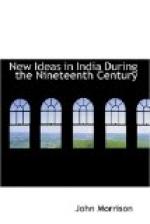[Sidenote: Obstacles to changes in religion.]
[Sidenote: Education strips new Indians of belief.]
Truth is great and will prevail, but let us not under-estimate the difficulties in the way of new opinions in India, where these do not appeal to the natural desires for power or status or comfort. I have already referred to the deep-rooted notion that Hinduism is of the soil of India, and adherence to it bound up with the national honour. I refer to it here again only to glance at a kindred notion, common among Anglo-Indians, that the Indian religion is the outcome of Indian environment, and is “consequently” the best religion for India. That superficial fallacy, undoubtedly, alienates the sympathy of many Anglo-Indians from religious and social progress in India. Thrice at least did one of the most distinguished viceroys, when addressing native audiences, advise them to stick to their own beliefs, using these or very similar words. He was addressing Mahomedans at one place, Hindus at the second place, and Buddhists at the third, and we leave his advice at one place to contradict his advice at another. Certainly let us allow for variation in local usage, and in subjective opinion, while we are insisting on the universality and objectivity of truth. For in spite of new and strange environment, in spite of that prevailing notion that religion is a racial thing, of the natural disinclination to change, of modern agnosticism and materialism when the old ideas do give way—in spite of these things, some of the cardinal features of Christianity are commending themselves to educated India. Far from religion being racial, the recent religious evolution of India suggests that in respect of the religious instinct and the religious faculty, mankind are one, not divided. A priori, therefore, we might anticipate that the elements of Christianity which have proved dynamical with new India will be the same that have proved their dynamic with educated men at home. So far as the situation in India has been created by the destructive influence of modern education, and by what may be called the modern spirit, the same influences are telling both in Europe and in India; they have come from Europe to India. There is the same unwillingness to believe in the supernatural, and the same demand that religion shall satisfy ethical and utilitarian tests. One difference, however, we may note. The educated men of India may not be living so entirely in the modern atmosphere as the men of Europe and America; but in India the modern spirit finds usages and systems of thought more inconsistent with modern ideas. As a consequence, where in India the modern spirit has come, it has stripped men barer of belief. Listen to the following curious conglomeration, showing the influences at work, constructive and destructive. It is a passage from the pamphlet already referred to, The Future of India; the author is arguing for what he calls “practical




